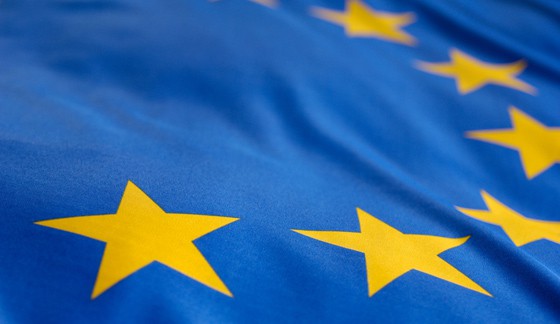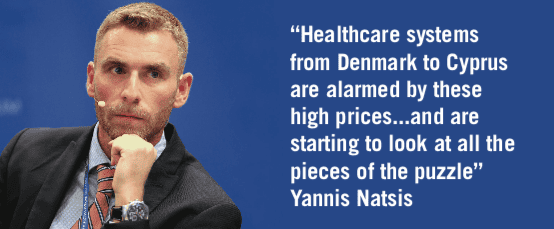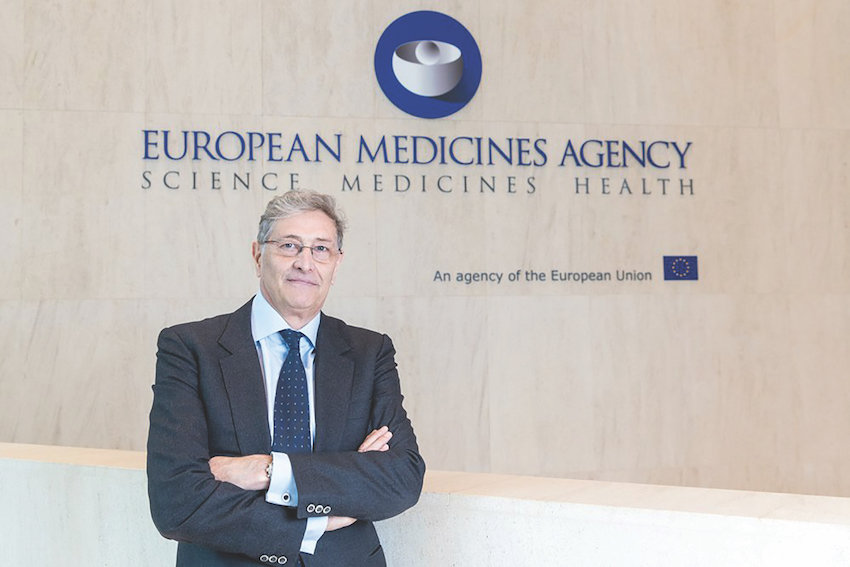
Yannis Natsis is one of Europe’s most outspoken critics of the pharmaceutical industry and its current relations with the European Medicines Agency, which he says have grown far too close.
He believes that the balance of power in healthcare in the European Union needs to shift, with patients and the public having more say on issues, particularly in regard to transparency in government decision-making and pharma industry price-setting.
Natsis is policy manager for Universal Access and Affordable Medicines at the European Public Health Alliance (EPHA), a Brussels-based organisation made up of public health NGOs, patient groups, health professionals and disease groups.
EPHA names improving health and strengthening the voice of public health in Europe as its mission, and sees holding government and big business to account as central to this.
The organisation reflects a well-established strand of left-of-centre politics in Europe, which has traditionally been deeply suspicious of pharma, and over the years has opposed any EU policies which it believes could hand power to the industry at the expense of public health and patients.

Recent years have undoubtedly seen some of the key issues – patents, prices and pharma’s transparency – rise up the agenda. This has been driven by the sector’s shift towards developing more and more orphan medicines – these are often groundbreaking advances for patients, but also carry very high price tags which put a strain on Europe’s healthcare systems.
Yannis said the controversy over Gilead’s hepatitis C drug Sovaldi was a turning point in the European debate, which has only intensified in the last year or two.
“Once upon a time we were dismissed as extremists, communists, activists – but that can’t be said anymore, because the issues we’re concerned about have gone mainstream.
“Now everybody is questioning intellectual property, patents and incentives and the role of the regulator [the European Medicines Agency]”.
EPHA says one of its core goals is to use ‘evidence-based advocacy’ to secure ‘better and affordable medicines for Europe by questioning and reforming the current pharmaceutical business model and calling for better access to medicines for all’.
2019 has already been very eventful in terms of the debate about pharma’s future, including the question of how to proceed with plans for harmonisation of health technology assessment (HTA) in the EU, which stalled over some member states and healthcare payers (such as Germany’s sick funds) believing it would interfere with national decision-making.
Another major controversy was the introduction of a new SPC waiver, now introduced despite staunch opposition from pharma, plus questions about the future direction of the European Medicines Agency, newly relocated to Amsterdam due to Brexit.
A European pricing debate
Another major development in the last few years has been the creation of multi-country procurement and price negotiation groups in Europe, most notably the Beneluxa consortium and the Valetta group.
“There is now an unprecedented debate about high prices, with governments working to challenge prices and speak up against imbalances in the current pharma business model,” said Natsis.
“Healthcare systems from Denmark to Cyprus are alarmed by these high prices….and governments are starting to look at all of these pieces of the puzzle.”
Natsis believes this is a pointer to the future direction of medicines pricing and reimbursement in Europe. While many in pharma fear this shift in the balance of power, Natsis says its influence should be curtailed – but believes that the industry doesn’t have to be the loser in this process.
“I think we are in a transition phase in pursuit of a new equilibrium. I say equilibrium, and I mean it, I’m not just saying it. I am the first to be delighted that the pharmaceutical sector in Europe is important and successful but it needs to be regulated.
“What I care about is how people get access to medicines in Europe, regardless of their country’s GDP or the location of their birth.”
Challenging EMA from the inside
Much to his surprise, Yannis was successful in his attempt earlier this year to become a member of the EMA’s management board.
He fills in one of two positions reserved for patients’ organisations over a three-year period which started on 15 June 2019.
He believes this came about because member states wanted to send a message about the need for change and accountability to patients at the EMA.
“I’ve been very critical of the role of the EMA and the industry that it is meant to regulate.
“I think my appointment sends very clear signals to multiple recipients that the wind is changing.”

The EMA’s Guido Rasi
He said that the executive director of the EMA, Guido Rasi, was summoned to speak to EU ministers in September 2018 – only the second time since 1995 that the head of the agency has been questioned in that way, underlining, in his view, just how unaccountable the regulator has become.
“In April, the EMA published a paper about added therapeutic benefits and drug licensing…it is now engaging with affordability arguments, so it can’t bury its head in the sand and say it doesn’t have influence on access and shaping the market.”
He said there is no question that the EMA has been preoccupied over the last three years by the Brexit-enforced relocation to Amsterdam, but is now settling into its new home and looking to the future.
It is currently consulting on the future of regulatory science, with the aim of how it should adapt over the next five to ten years.
Recent years has seen a move towards medicines regulators working more closely with pharma to speed innovative treatments to market (spearheaded in particular by the FDA), but Yannis questions some assumptions about what the EMA’s priorities are.
“The EMA is there to protect and promote public health, not promote the industry. There are a lot of questions to address. Do we need to accelerate the approvals in Europe even more? I think speed is not always of the essence, and can harm patients.”
He also questions the ‘orphanisation’ of the industry’s pipeline, where US and EU initiatives have incentivised the sector toward developing more rare disease drugs, even though these might not be the big public health priorities globally.
Once again, he stresses that he is not anti-pharma, but does believe its profit motive needs to be kept in check.
“It’s good when they make a profit. It’s only when they profiteer to the detriment of public healthcare systems and patients that I have a problem,” he said, and added: “Equally we shouldn’t allow governments to procrastinate when it comes to making new medicines available.”
Natsis believes that the rules of the game are changing, pointing to the UK government’s row with Vertex over cystic fibrosis drug Orkambi as a prime example.
“In 2019, we’ve seen government ministers in the House of Commons discussing the possibility of Crown Use [compulsory licensing] – who would have imagined that a few years ago?”
He blames the situation on the ‘arrogance’ of Vertex, which he claims the rest of the industry is trying to distance itself from, although he added that it is not the only offender, citing Roche’s attempts to withdraw drugs in Greece some years ago.
Sustainable solutions?
So what does Natsis think about new payment models being put forward by pharma and healthcare systems, such as pay-for-performance and outcomes-based payment, in tandem with greater real-world evidence (RWE)?
“Everyone is looking for options, but nobody has a silver bullet,” he said. “RWE sounds really nice, [but we have to step back] and understand who is proposing these solutions, and how they are being framed.
The view from EFPIA
There’s no doubt that the views of Yannis Natsis and EPHA are a world away from those of the industry and its EU organisation, EFPIA.
That goes for both the problems in European healthcare, and the solutions. We put some of these views to EFPIA’s spokespeople.
PME: EPHA believes the pharma industry business model is in need of correction eg, that intellectual properry (IP) incentives are tipped too far in its favour and that its prices are too high. What is the EPFIA view on those issues?
EFPIA: What all those involved in healthcare have in common is our desire to deliver the best outcomes we can for patients – that means looking right across the patient pathway at the 15-20% spent on medicines and the 80% spent on other aspects of care – and ensuring we allocate resources for the things that make the interventions that deliver the outcomes that patients really care about.
If we look at the challenges ahead – such as dementia, increased prevalence of cancer and diabetes – there is no doubt that the answer to addressing these challenges will lie in innovation. Just doing more of the same as demand for healthcare rises is not sustainable. For patients across Europe, we have to create an environment that fosters and supports medical innovation.
In the healthcare sector, innovation means improved health outcomes: avoiding illness, slowing disease progression, improving patients’ lives and reducing overall costs for healthcare systems.
IP is the foundation on which all medical innovation is built. IP and the EU’s framework of pharmaceutical incentives provide companies researching and developing new medicines the certainty that if a medicine makes it to the market, it will be protected from unfair competition for a limited period of time. This is what they need to invest in the long, complex, risky and costly process of delivering new medicines to patients, to healthcare systems and to society, and what paves the way for low-cost generics to be used by healthcare systems.
PME: How do Europe’s healthcare systems need to evolve?
EFPIA: Our current system means the costs are borne in year one from the medicines budget in isolation, while the value is delivered over the lifetime of the patient – reduced reliance on other medicines, hospital visits, operations, ability to return to work, etc. We’re committed to working with partners in healthcare to balance need for new treatments with making healthcare affordable now and sustainable in the future.
PME: A number of stakeholders say that EFPIA’s opposition to the SPC Waiver was disproportionate, and influenced by US pharma lobby groups such as PhRMA. What does EFPIA say on that score?
EFPIA: We are a global industry committed to the development of new treatments and cures for patients now and in the future. Wherever you are located, it is clear that the recent adoption of the SPC Waiver sends a negative signal to the world that Europe is devaluing its IP framework, making Europe a less attractive location for R&D, impacting on jobs and investment.
The next Commission will need to look for opportunities to redress the balance, supporting innovation and restoring international confidence in Europe as a research destination with practical initiatives that can once again make it a global leader in medical R&D.
PME: Lastly, Europe is looking ahead to the next five-year term of the European Commission. What does EFPIA want to see as the priorities in that time?
EFPIA: We’re looking forward to working with MEPs, the Commission and Council as they look to the next mandate. EFPIA recently set out its manifesto of nine concrete proposals:
- Drive the evolution towards outcomes-focused healthcare systems
- Improve patient access
- Build a coalition on vaccination
- Fast-track breakthrough therapies that address unmet needs
- Maintain and develop Europe’s world-class IP system
- Advance Europe’s Smart trade agenda
- Foster the adoption of new clinical trial design supported by digital tools
- Support a flexible legal framework for Public Private Partnerships in health
- Launch a new strategic dialogue on healthcare and life sciences in the EU




